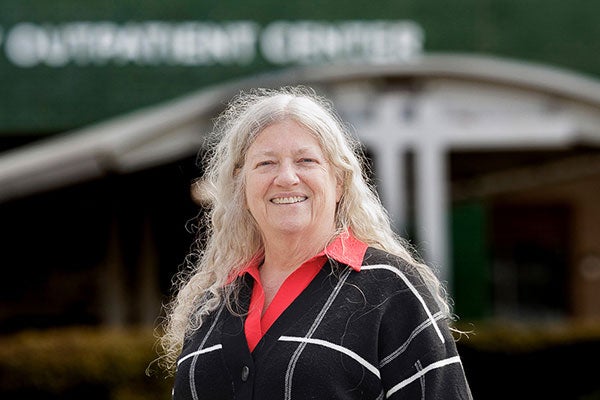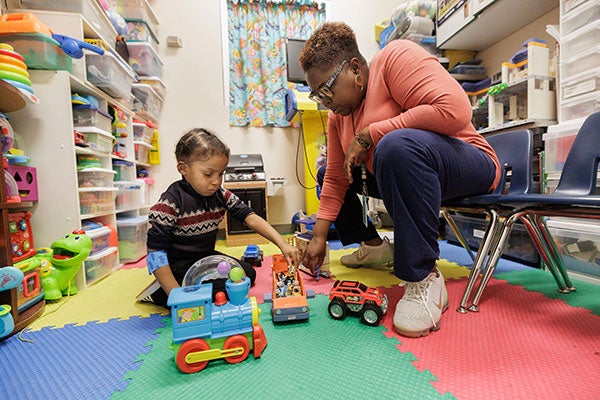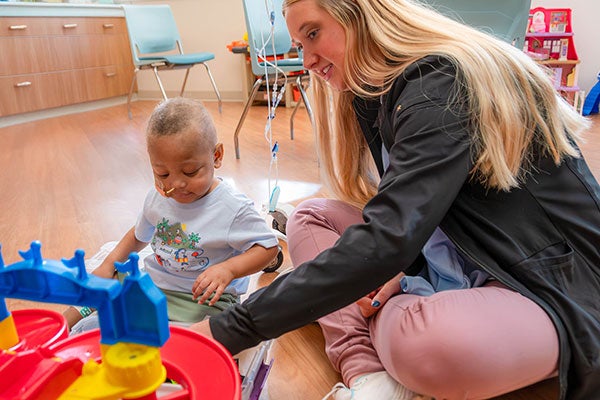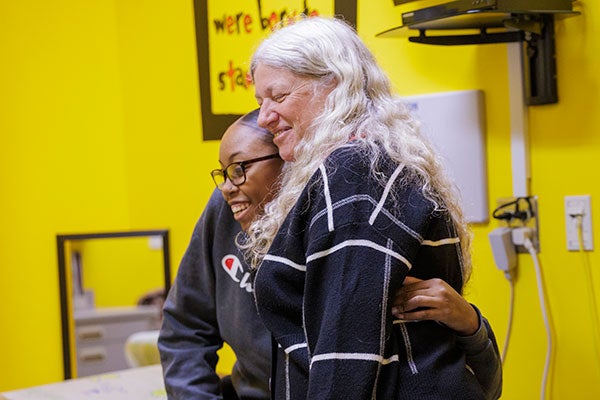Child life specialists treat childhood fears, grow resilient humans
Thursday mornings at the Brody Outpatient Clinic’s pediatric hematology-oncology practice is given over to children with sickle cell disease, a congenital condition that limits aerobic activity and can be painful in the extreme. For decades, one of the friendliest faces youngsters saw was Jacque Sauls’.

Jacque Sauls was the longtime child life specialist at the ECU Health Physicians’ Brody Outpatient Clinic’s Pediatric Oncology-Hematology practice before she retired. Sauls was in the vanguard of the profession when it began in the 1980s and 1990s in Greenville. (Photo by Steven Mantilla)
Sauls has retired as a child life specialist and director of Rainbow Services, which hosts two summer camps for children living with pediatric cancer, hemophilia and bleeding disorders, and sickle cell disease. She’d been a child life specialist for nearly 40 years, helping define the position and its degree program at East Carolina University.
“I love you,” Ta’Nija Miller called out to Sauls as she walked down the hall to exit.
“I love you, too,” Sauls called back.
Miller is a pediatric patient facing the transition to adult care. She has known Sauls and the staff her entire life — “they’re like my aunties.” This medical transition to adult services is a phase the profession has honed in on.
In the mid-1980s when she began, Sauls would have had the title of child development or child family specialist, for which there was no degree path. ECU’s Dr. Charles Snow saw his graduates getting hired by hospitals, including what is now ECU Health Medical Center for these new careers. He got certified in child life and charted the degree path in 1990. The first dedicated course was called “The Hospitalized Child.” It’s still a required course.
“He was very forward-thinking and saw that three of his grads were working in the field,” Sauls said — Debbie Abernathy, Jill Scercy and Sauls. “He believed he could attract out-of-state students for it. We were the only ones in North Carolina with a degree in child life.”
About this time, “An Experimental Evaluation of a Model Child Life Program” was published, and by the end of the 1990s, professional certification by method of examination was established.
In the early 2000s, Tamika Mackey earned her degree in human development and family science and harbored a dream of opening a daycare center, but on the strength of Sauls’ encouragement, she applied for a child life position at the hospital. She got it. A year later, when the same position at Sauls’ hematology-oncology clinic posted, it was fated.
“The connection Jacque has with the patients, their families, I just loved that. She gave me the roadmap,” Mackey said.
“Even working with children who have not beaten cancer, they have been able to tell me that they’re scared and what they’re scared of,” Sauls said. “Their strength to share that journey with someone else is so important.”
‘Play Through What They’re Experiencing’

Child life specialist Tamika Mackey works with Noah, a 3-year-old patient with sickle cell disease. Mackey and the staff at ECU Health Physicians’ Pediatric Oncology-Hematology practice take time to communicate with Noah through play to build trust. (Photo by Steven Mantilla)
In 2008, the Child Life Council released “Child Life Beyond the Hospital.” Specialists had found work in outpatient settings like emergency departments, radiology and imaging as well as in-patient units; they were in specialty care clinics, behavioral and rehabilitation facilities, private practice, community outreach, home health, camps for children with health care needs, and even dental practices.
A child life specialist’s role is to attend to the psychosocial needs of children in a hospital or health care setting, easing the stressful (needle sticks) and promoting resilience (coping skills). A recent study found 93% of families expressed greater satisfaction following clinical visits when a child life team was present. A still more recent study found that far fewer pediatric same-day surgery patients used benzodiazepine (sedatives) when certified child life specialists were integrated into care.
“A child who might not speak to their doctor will spend time with a child life specialist and play through what they’re experiencing,” Sauls said.
Children born with a blood disorder or incurable cancer may become adults who need regular services but who age out of pediatrics and parents’ health insurance.
“Transition medicine is a big trend in child life now — going to college with a chronic illness, taking ownership of their conditions, preparing for insurance. We’re not just sending our patients elsewhere but preparing them for success,” Sauls said.
‘We Have To Know Every Procedure’
Over on the second floor of the James and Connie Maynard Children’s Hospital, Kelsey Bennett follows toddler Kade, 2, around on his tour of the playroom in the Kids Immunosuppressed Specialty Unit, pulling his nasogastric (NG) pump stand behind him so his tube stays loose. Mom Kenyatta Daniels is happy, if tired.

Kelsey Bennett, a child life specialist I at ECU Health Medical Center and a child life major at ECU, sits on the floor and plays with Kade, 2, inside the James and Connie Maynard Children’s Hospital’s Kids Immunosuppressed Specialty Unit. (Photo by Rachel Carlin, ECU Health)
“When we’re here, we might be bored, we get depressed — the depression of it all — but they (child life specialists) liven it up. They really do that,” said Daniels.
Bennett is a classified child life specialist I at the hospital. She was a child life major when she graduated in 2023. The major requires a semester-long internship, 600 hours. She applied to 30 hospitals for just two interviews and one offer — ECU Health Medical Center.
There may be more than 6,000 certified child life specialists working in the U.S., and the profession is expected to grow this decade by 13%, according to the Bureau of Labor Statistics.
Despite this, internships are very competitive, yet the majority of child life majors are successful in securing one before graduating, said Dr. Priti Desai, an associate professor who leads the degree program. ECU boasts a robust program, though, placing graduates all over the nation, from Boston Children’s Hospital to health systems in California.
“If you’re highly motivated and it’s a passion of yours, go for it,” Bennett said, “but understand it’s not all play. In fact, it’s not very much play at all, despite how it looks.
“We’re interdisciplinary,” she said. “We have to know every procedure, what happens, how doctors do it, what it feels like, what it looks like. We use medical play dolls to explain it to our patients. We’ll use a real NG tube, show them real medical equipment.
“It may take a toll on your mental health. We deal with the highs and lows. We go from celebrating a birthday to a palliative care family meeting. We take a stress class and make time for the things that make how we’re feeling a priority.”
But she loves the hospital setting, its standards of excellence and its opportunity for connection and care.
‘Medication Is Just One Thing.’

Child life specialist Jacque Sauls, newly retired, gives pediatric oncology-hematology patient Aliyah Purnell a hug. Purnell will soon transition into adult services, a complicated phase of health care that Sauls says is one her profession is keen to serve. (Photo by Steven Manilla)
Back at the clinic, another young adult patient with a strong bond to Sauls and the staff is Aliyah Purnell, 20. Like Miller, she is aging out of pediatrics. She remembers that Sauls and others “made me feel like I could do anything anyone else can do. I felt like I was on top of the world growing up.”
Across the hall, Shalanda Hines sits in an exam room while her grandson Noah and his grandfather visit Tamika Mackey’s office and its oversupply of toys and puppets. Just 3, Noah has been in and out of the hospital, and for a time he was “frantic,” Hines said.
“He didn’t want to see nobody, no doctor, no nurse, no anyone, and any time a doctor came near him, he would just bust out crying,” she said.
But here in the clinic, the staff take time to communicate with Noah through play and to build trust. That day, he was excited to sit down at the kids’ station in the lobby and play with the toy farm. On the walls around him were encouraging messages.
“They have these posters, like, ‘I am brave. I am strong. I’m important.’ That makes a huge difference, even for the parents,” Hines said.
“Child life compensates for some of the more painful things that we do in clinic,” said Dr. Beng Fuh. “Treating blood disorders and cancer is really about wellness. Medication is just one thing. Getting over and accepting your medical condition, knowing that is something you have but does not define you, that is important early on if they’re going to be productive later.”
‘They Call Her for Life Advice.’
A short walk from the clinic are the critical care floors at ECU Health Medical Center. Sauls has been to the bedsides of 30- and 40-year-old sickle cell patients there. They reminisce about Camp Hope, the summer camp for children in eastern North Carolina living with the disease. These men and women were young once, weighed down by the affliction but giddy about camp.
Fuh, the pediatrician specializing in sickle cell disease, said Sauls has given patients her mobile number, and they use it.
“These young adults, they call her for life advice. They call her for issues they have at school,” he said. “See! She only thinks she is retired. It is only in her mind.”
Fuh, Sauls, Mackey and the rest have shepherded this patient population through such hardships, but they’ve been heartened, too, by their development and growth, and a relationship develops over time.
“They come by and visit when they have their children,” Sauls said. “That’s a really special thing. It’s nice to think they look back at those times, those difficult times, but that they were also times they learned a lot about themselves.”
“It’s definitely a labor of love.”